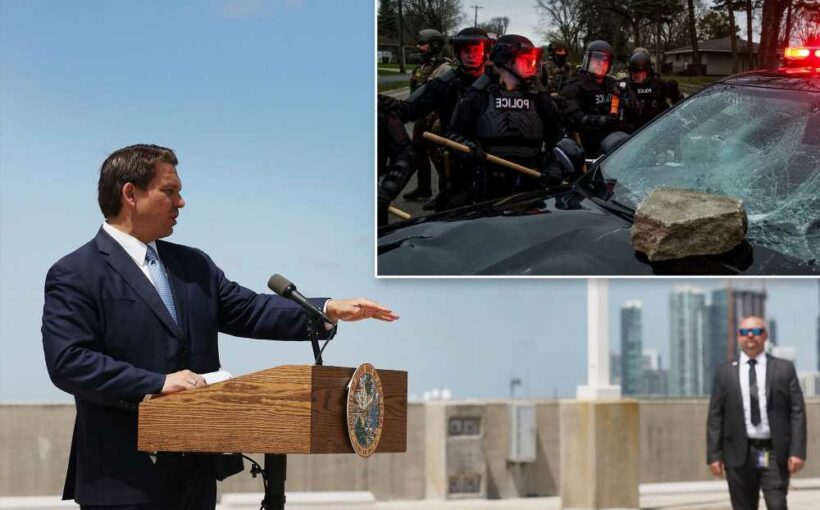More On:
riots
Two Proud Boys leaders ordered locked up pending Capitol riot trials
‘Twisted’ justice in Minneapolis and other commentary
Angry protests break out across US over Minnesota police shooting
Riots rock Montreal as COVID lockdown protests turn ugly
Florida Gov. Ron DeSantis has signed into law an “anti-riot” aimed at cracking down on civil unrest — with provisions that include civil immunity to people who drive through protesters blocking roads.
The controversial law was inked on Monday and goes into effect immediately, according to The Orlando Sentinel.
“If you look at the breadth of this particular piece of legislation, it is the strongest anti-rioting, pro-law enforcement piece of legislation in the country,” DeSantis said at a press conference in Winter Haven surrounded by various members of law enforcement, the paper reported. “There’s just nothing even close.”
The law grants civil immunity for people who drive through demonstrators blocking a road, meaning they can’t be sued for damages if protesters get hurt or killed — though they could still face criminal charges.
Ahead of the bill’s passing, Democrats asked if such a provision would have protected the white nationalist who ran over and killed counter-protester Heather Heyer in Charlottesville, Virginia, in 2017.
But Republicans said the immunity would only apply if the driver claims self-defense.
“That person rammed a vehicle into those people to hurt them,” GOP state Sen. Danny Burgess said about Heyer’s killer, according to the Orlando Sentinel. “He wasn’t defending himself.”
The bill also enhances penalties for crimes committed during riots or violent protests in the Sunshine State.
It also permits authorities to hold arrested protesters until their first court appearances, and will establish new felonies for taking part in, or organizing, violent demonstrations.
The law also strips local governments of civil liability protections if they interfere with law enforcement’s efforts to respond to a violent protest.
It also adds language to state law that could force local governments to justify a reduction in law enforcement budgets.
The legislation will make it a second-degree felony — punishable by 10 years behind bars — to destroy or demolish memorials, plaques, flags, paintings, structures or other objects commemorating historical people or events.
That includes Confederate monuments, according to the Sentinel.
Critics bashed the bill as a racist reaction to a problem that has not affected Florida — and an attempt to silence the voices of groups like Black Lives Matter.
With Post wires
Share this article:
Source: Read Full Article


